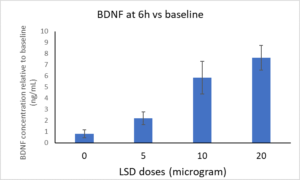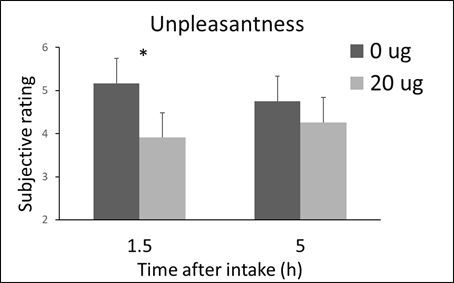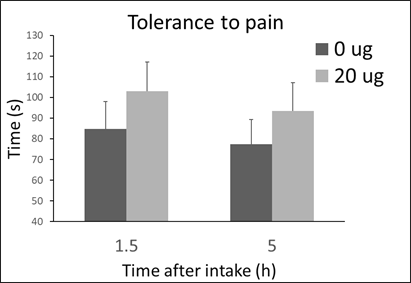Beckley/Maastricht LSD microdosing study: finding the proper dose
First evidence for an effect of LSD microdosing on neuroplasticity in humans
The Beckley/Maastricht Microdosing Research Programme was set up to study the effects of LSD microdosing on humans, with a particular focus on mood, cognitive functions, and pain management. The study, exploring the dose-response relationship in LSD-induced physiological and psychological effects, saw twenty-four healthy volunteers each receive single doses of 5, 10 and 20 micrograms of LSD, or a placebo.
Results clearly demonstrate, for the first time in a controlled and rigorous way, the positive effects of microdosing on mood, cognition and pain management.
Given the interest in BDNF (Brain-derived neurotrophic factor) as a key marker in several
neurodegenerative and neuropsychiatric disorders, our Beckley/Maastricht dose-finding microdosing study included, among other measures, that of changes in BDNF plasma levels following low doses of LSD (5, 10, and 20 μg) or a placebo, in healthy volunteers.
The findings demonstrated an increase in BDNF starting 4h after LSD administration. 6h afteradministration, the increase in BDNF level was proportionate to the dose of LSD administered, a remarkable result that warrants studies in patient populations.

Change in BDNF at 6h post dosing relative to baseline
Important role of BDNF regulation in health and disease
Various studies have shown possible links between BDNF and conditions such as depression,
obsessive-compulsive disorder, Alzheimer’s disease, diabetes, and eating disorders.
Conversely, higherlevels of the protein are associated with improved cognitive fuctioning, mental health, and short- anlong-term memory.
LSD Microdosing found to increase BDNF level, a marker of neuroplasticity
LSD microdosing enhances tolerance to pain
Among other measures collected throughout the microdosing days, pain tolerance levels were assessed using a Cold Pressor Test, a valid and low-risk test for evaluating individual pain thresholds which involves the use of a tank filled with 3°C-cold water. Volunteers were asked to submerge their hands in the cold water for as long as they could manage. Dependent measures of the Cold Pressor Test include pain tolerance (i.e. the duration for which participants can hold their hand in the tank) and subjective ratings of painfulness, unpleasantness and stress.
The study consistently indicated that a 20 microgram dose of LSD significantly reduced pain perception, as compared to the placebo, even though lower doses did not have the same effect.
The overall pain tolerance on 20 micrograms increased by 20%, meaning that volunteers were able to remain immersed in the cold water for substantially longer with a 20 microgram dose of LSD compared to those on placebo. Subjects also reported a decrease in the subjective experience of painfulness and unpleasantness.
Remarkably, changes in pain tolerance and subjective pain perception induced by the low dose of LSD under these circumstances were comparable in magnitude to those observed after administration of opioids, such as oxycodone and morphine to healthy volunteers.
A low dose of lysergic acid diethylamide decreases pain perception in healthy volunteers
Microdosing improves mood and vigilance
Our result also demonstrate that small doses of LSD – particularly the highest dose we investigated (20 micrograms) – significantly enhanced positive mood as well as vigilance in our group of healthy participants.
Publications
Podcast
- All
Links
- All
Support
- All
BIPRP
- All
Science Talk
- All
Amanda's Talks
- All
- Video Talk
- Featured
- 2016 Onwards
- 2011-2015
- 2010 and Earlier
- Science Talk
- Policy Talk
One-pager
- All
Music
- All
Amanda Feilding
- All
Events
- All
Highlights
- All
Psilocybin for Depression
- All
Current
- All
Category
- All
- Science
- Policy
- Culture
Substance/Method
- All
- Opiates
- Novel Psychoactive Substances
- Meditation
- Trepanation
- LSD
- Psilocybin
- Cannabis/cannabinoids
- Ayahuasca/DMT
- Coca/Cocaine
- MDMA
Collaboration
- All
- Beckley/Brazil Research Programme
- Beckley/Maastricht Research Programme
- Exeter University
- ICEERS
- Beckley/Sant Pau Research Programme
- University College London
- New York University
- Cardiff University
- Madrid Computense University
- Ethnobotanicals Research Programme
- Freiburg University
- Medical Office for Psychiatry and Psychotherapy, Solothurn
- Beckley/Sechenov Institute Research programme
- Hannover Medical School
- Beckley/Imperial Research Programme
- King's College London
- Johns Hopkins University
Clinical Application
- All
- Depression
- Addictions
- Anxiety
- Psychosis
- PTSD
- Cancer
- Cluster Headaches
Policy Focus
- All
- Policy Reports
- Advisory Work
- Seminar Series
- Advocacy/Campaigns
Type of publication
- All
- Original research
- Report
- Review
- Opinion/Correspondence
- Book
- Book chapter
- Conference abstract
- Petition/campaign
Search type


